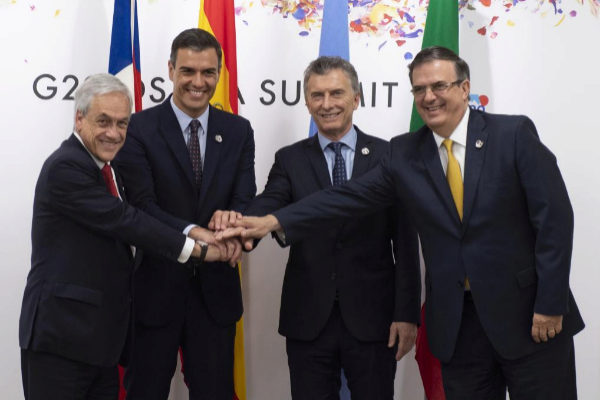- G-20.The EU and Mercosur sign an association agreement after 20 years of negotiation
«People today do not want reasoning, they want emotion. People, it must be said, are too excited ». The phrase is from Fernando Henrique Cardoso, that French-born sociologist who presided over Brazil in the second half of the 90s. Those "people" that Cardoso spoke of during a visit to Buenos Aires this week include the leaders, the presidents. Some of those same presidents who concluded the agreement between the European Union (EU) and Mercosur at the end of June in Osaka now threaten to dismantle it.
Mauricio Macri, the now devalued Argentine president, made a remarkable diplomatic effort at that G20 summit to bring together Emmanuel Macron and Jair Bolsonaro, water and oil from the international scene. Macri managed to park mutual mistrust and stamp his signature on an agreement that took 20 years of negotiations. Just weeks later, and with the Amazon fires as a banner, Macron leads a current in Europe that tells Bolsonaro something very clear: if the Amazon doesn't worry you, forget about the agreement with the EU. And together with Macron they say something similar Angela Merkel and the Prime Minister of Ireland. The ratification of the agreement, which involves each and every one of the countries of both blocks, is thus in the air, especially because of the mutual disqualifications that cross between Paris and Brasilia.
The situation is followed with high concern in Buenos Aires. Not only because of the escalation of tension between Bolsonaro and Macron, but because of the awareness that Macri has fewer diplomatic weapons than in Osaka, less ability to calm the waters between Macron and Bolsonaro. The primary elections of August 11, which gave a resounding triumph to the Peronist Alberto Fernández over Macri, reduced the room for maneuver of the current president and led to the eyes being on the opposition candidate and likely new Argentine head of state from from December 10.
What does Fernández think about the EU-Mercosur agreement? There is another problem: it is not clear what he wants. In the same forum in which Cardoso, 83, marveled at reflections of a world that no longer exists, Fernández referred to the agreement with the European Union and left doubts.
«How will I be against me for Argentina to open up to the world? Now, the issue is how we enter the world. The issue is what is in that agreement with the EU that is not an agreement ». The reference to "an agreement that is not an agreement" caught the attention of many of the listeners. EL MUNDO tried to broaden and clarify the idea of the candidate, but Fernández did not respond to the inquiries of this newspaper.
What can be intuited, taking into account the economic creed of Peronism that Fernández embodies (“in economics I am a pragmatist”), is that if he comes to the presidency he will try to work fine on some clauses of the agreement to protect certain sectors of the industry , some of them among the most inefficient, but that generate a lot of employment. If something was clear from the agreement, it is that the agricultural sector of Mercosur was winning and that the European automotive industry opened important facilities in a large market.
The question is how will Mercosur negotiate from now on. Macri had managed to generate an important tune with the unpredictable and volcanic Bolsonaro, but if Fernández is the new president - with Cristina Kirchner as a vigilant and powerful vice president - his attunement with the Brazilian neighbor will be nil.
«He is a racist, a misogynist, a violent. A guy celebrating torture on Dilma Rousseff, ”said Fernández de Bolsonaro after receiving relentless provocations. The Brazilian said, among other things, that if Fernández wins his southern border will be filled with Argentines who want to flee the country, such as Venezuelans from the north, and that in Argentina they can win the elections "a band of leftist criminals."
Despite the verbal escalation, the rational thing is to think that the EU will not overthrow the agreement with Mercosur. Against the backdrop of the no-quarter trade war against China to which Donald Trump is launched, Europe knows it needs to expand markets. For a sample, this week's statement from the Club of Spanish Exporters and Investors, which lamented political paralysis in the country and said that this is affecting the economy: «Spain should [Mercosur] enter into force as soon as possible. It is a priority to boost exports to that region » .
Bolsonaro's intention is to open Mercosur to all possible markets, something that coincides with Macri and probably not quite with Fernández. While Macron doubted Osaka's agreement, Mercosur, which in this semester is chaired by Brazil, announced a free trade agreement with EFTA . What is the EFTA? The European Free Trade Association, made up of Switzerland, Norway, Iceland and Liechtenstein, four countries that are not part of the EU.
"It is a great victory for our commercial opening diplomacy," Bolsonaro celebrated. And, in Buenos Aires, the agreement was taken as a respite and a signal to the rest of Europe. It is "a new milestone," said the Foreign Ministry, "which deepens and prioritizes our historical link with the European continent."
Cardoso said it on Thursday: today's international politics needs " a little less anguish and a little more strategy."
According to the criteria of The Trust Project
Know more- Mercosur
- Europe
- Brazil
- European Union
- Spain
- Angela Merkel
- Mauricio Macri
- Norway
- Paris
- China
- Dilma Rousseff
- Donald Trump
- THE WORLD
- Emmanuel Macron
- Jair Bolsonaro
- Latin America
Macroeconomics The fall of the pound shakes Johnson's hard Brexit
Summit starts the G7 of Biarritz under strong security measures
Trade war: Spanish oil is not afraid of Trump: exports grow 47%

